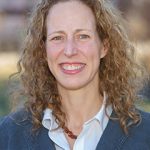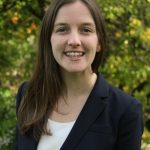Fall Research Competition opens with a history of projects that are impactful, influential and see greater success in securing larger-scale grants
Ninety miles from Raleigh, North Carolina, in the farming town of Newton Grove, sits Our Lady of Guadalupe Catholic Church nestled in the cotton fields. This nearly 150-year-old parish is best known for the forced desegregation of its churches and schools in 1953. However, attending only to its desegregation activities overlooks how broadly the story of this Catholic parish disrupts many assumptions of American religious history.
A Fall Research Competition (FRC) award helped Susan Ridgley, Religious Studies Program director and graduate advisor, to explore this vibrant rural, southern parish. Ridgley’s FRC project is an oral history of one of the oldest Roman Catholic churches in North Carolina. Her findings upend the long-held assumption that Black religious innovation occurred only after the Great Migration north and was focused on urban migrants. They also chip away at the longstanding notion that there was a unified white Southern position on race and godliness.
A new round of the Fall Research Competition opens Aug. 7 at 8 a.m. and closes Sept. 8, 2023 at 4:30 p.m. Funds are selected for research projects across each division — biological sciences, physical sciences, social sciences and the arts and humanities. Faculty members and permanent principal investigators (PI) may submit one application to the standard competition. This submission may be either individual or involve collaboration with another faculty member or permanent PI. Applicants will be notified of the outcome in December. The application and instructions are available at: https://research.wisc.edu/funding/fall-competition/ .
The FRC, administered by the Office of the Vice Chancellor for Research and Graduate Education (OVCRGE), is available because of the impressive efforts of UW–Madison faculty and staff in filing successful patents through the Wisconsin Alumni Research Foundation (WARF), and the generous support of WARF.
“The Fall Research Competition is an important and unique UW–Madison tradition,” says Steve Ackerman, vice chancellor for research and graduate education. “Its annual success is evident in its use as a recruiting tool to land some of our best and brightest early career faculty, its support of training graduate students, its capacity to create a bridge to extramural funding, and its success helping researchers generate data necessary to create stronger extramural proposals. In the OVCRGE, we hear from researchers across campus and the divisions that the Fall Research Competition is a significant contributor to UW–Madison’s status as a top 10 academic research institution.”
“I am using FRC funds to return to Newton Grove to engage directly with the community and the land that that centers so prominently in this project,” Ridgley says. “I have already sent chapters out to many of my interviewees and received valuable suggestions. The trip will allow me to have deeper discussions with participants as well as to tour family cemeteries and other sites with them. It will also give me the chance to introduce the project to members of the wider community to receive their feedback as well.”
Using oral histories and archival research, Ridgley gives voice to these rural Southern Catholics—including the priests who administered the parish, the sisters who taught at its schools, and the believers who filled its pews—to center the everyday lives of those folks connected to the Catholic Church in Newton Grove. These interviews provide an extraordinary picture of the ongoing interplay of race, religion, and generational memory in this parish, in this state, and America more broadly. The voices captured are central to understanding this story and the story of Southern rural religion as a whole.
The parish, Ridgley explains, is a case study into how overlooked rural congregations formed new identities and reimagined older ones even as parishioners’ feet remained firmly planted in Southern soil in the long century after the Civil War, through the integration of the public school system in North Carolina in the mid-1970s, and the widespread failure of family farms in the 1980s.
Ridgley’s advice to faculty applying to the FRC is to think of the process as twofold: proposal and interview.
“Be disciplined as you write your proposal, knowing that it will be read and evaluated by faculty from a variety of fields,” Ridgley says. “You will have to cut ideas that are important to you, but that doesn’t mean they won’t be part of your evaluation. Make note of the ideas that you cut and highlight them during your interview.”
Corina Mommaerts, assistant professor in economics, echoes that advice to consider diverse audiences when penning a FRC proposal.
“As is the case with many funders, it is important to realize that the people evaluating the project proposal are not necessarily experts on the topic of your project, which means that it is vital to describe and motivate the project for a broader audience,” Mommaerts says. “It is also helpful to demonstrate how the project could result in future external funding, launch a promising future agenda, or reach broader audiences such as policymakers – think: why should FRC invest in this project?”
Mommaerts’ FRC project centers on studying the labor market impacts of the largest wage subsidy program in the United States, the federal Work Opportunity Tax Credit (WOTC), which subsidizes the wages of over two million disadvantaged workers annually (more than the number of workers earning minimum wage).
“The motivation for this project is that a major policy challenge is how to best generate economic opportunities for workers, especially for those who may face discrimination in the labor market,” Mommaerts says. “One potential solution is wage subsidies, in which the government incentivizes firms to hire workers by paying a fraction of their wages. Yet there has been little research quantifying the effects of this program. One reason for that is that it is difficult to acquire the necessary data on labor market outcomes for workers and WOTC eligibility rules, but the Institute for Research on Poverty here at UW–Madison has built the infrastructure required for such a project.”
The FRC grant supplemented an external grant Mommaerts received from the Smith Richardson Foundation, which funded the data acquisition for the project.
To make the best use of the FRC funds available, applicants are asked to seek and obtain other resources in support of their research. Information about the granting procedures of various federal and non-federal agencies is available from the Office of Research & Sponsored Programs website: https://rsp.wisc.edu/. Information regarding the Research Committee Policies for 2023 can be found at: https://research.wisc.edu/funding/administration-of-awards/research-committee-policies/.
“I used the FRC grant to cover a PhD student research assistant in the economics department to work with several large administrative datasets,’ Mommaerts explains. “This work involved data cleaning as well as preliminary statistical analyses, which are essential skills for a PhD student interested in doing applied economics research.”
Mommaerts’ project leverages unique linked administrative data and exploits policy changes in the WOTC program over time to study whether WOTC affects employment in both the short- and long-run as well as non-employment outcomes such as public benefit use and criminal activity. And the project comes at a critical time as it is of interest to policymakers.
“Our results provide evidence for policymakers on the effectiveness of the program and suggest avenues for future reform,” Mommaerts says. “This project is well-timed, as our results will be useful to states that are currently considering adoption of state wage subsidy programs to supplement the federal program.”
For Assistance in Completing the FRC Application
Questions about the application?
competitions@research.wisc.edu or 608-262-8386
Having technical difficulties?
vcrge-it@lists.wisc.edu
By Natasha Kassulke, natasha.kassulke@wisc.edu
###


